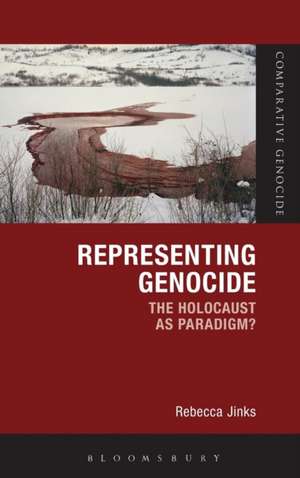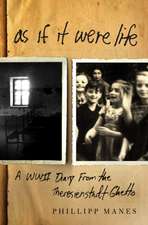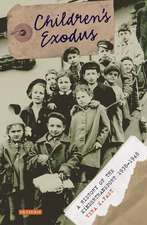Representing Genocide: The Holocaust as Paradigm?: Comparative Genocide
Autor Dr Rebecca Jinksen Limba Engleză Hardback – iun 2016
Preț: 774.62 lei
Preț vechi: 1113.40 lei
-30% Nou
Puncte Express: 1162
Preț estimativ în valută:
148.23€ • 155.07$ • 123.13£
148.23€ • 155.07$ • 123.13£
Carte tipărită la comandă
Livrare economică 03-17 aprilie
Preluare comenzi: 021 569.72.76
Specificații
ISBN-13: 9781474256940
ISBN-10: 1474256945
Pagini: 280
Ilustrații: 13 bw illus
Dimensiuni: 156 x 234 x 28 mm
Greutate: 0.57 kg
Editura: Bloomsbury Publishing
Colecția Bloomsbury Academic
Seria Comparative Genocide
Locul publicării:London, United Kingdom
ISBN-10: 1474256945
Pagini: 280
Ilustrații: 13 bw illus
Dimensiuni: 156 x 234 x 28 mm
Greutate: 0.57 kg
Editura: Bloomsbury Publishing
Colecția Bloomsbury Academic
Seria Comparative Genocide
Locul publicării:London, United Kingdom
Caracteristici
Offers an important perspective on, and intervention into, current debates about Holocaust memory, representation and its impact
Notă biografică
Rebecca Jinks is Lecturer in Holocaust Studies at Royal Holloway, University of London, UK.
Cuprins
1. Introduction2. Recognising Genocide: The 'Genocidal Imaginary'3. Explaining Genocide: Representations of the Origins and Perpetrators of Genocide4. Witnessing Genocide: Western Protagonists in the Theatre of Genocide5. Resolving Genocide: Representations of the Aftermath6. Responding to Genocide: Attitudes and Platitudes7. ConclusionBibliographyIndex
Recenzii
A useful introductory survey ... It is a timely contribution to an already growing body of scholarship.
Excellent ... this is a highly ambitious and innovative book, one that raises bold questions and offers equally thought-provoking answers ... a beautifully written, thought-provoking monograph, one that is likely to move comparative genocide studies in exciting new directions.
Accessible to non-specialists, Representing Genocide considers mass killings in Armenia, Cambodia, Bosnia and Rwanda, sharing knowledge that is little-known to the general public. Jinks considers expressive forms including novels, memoir, visual arts, comics and film, without getting lost in detailed textual analysis.
Jinks' study provides a thoroughly original and innovative examination of representations of genocides other than the Holocaust - an area that has demanded more attention for a long time. The impressive breadth and depth of research combines with a highly articulate and accessible writing style that opens its intriguing subject matter up to a wide audience. An excellent piece of scholarship that engages with diverse media forms to consider some of the crucial questions for genocide representation in the 21st century. Highly recommended.
Jinks' insightful book is the first of its kind to apply lessons learned from the history of Holocaust representation to deepen our grasp of its importance for the representation of other genocides. Breathtaking in both its geographical span and disciplinary scope, Jinks' rich and well-informed analyses of representations of genocide across nations, cultures, and disciplines offer an exemplary path toward understanding the impact of mass killings in our time.
Excellent ... this is a highly ambitious and innovative book, one that raises bold questions and offers equally thought-provoking answers ... a beautifully written, thought-provoking monograph, one that is likely to move comparative genocide studies in exciting new directions.
Accessible to non-specialists, Representing Genocide considers mass killings in Armenia, Cambodia, Bosnia and Rwanda, sharing knowledge that is little-known to the general public. Jinks considers expressive forms including novels, memoir, visual arts, comics and film, without getting lost in detailed textual analysis.
Jinks' study provides a thoroughly original and innovative examination of representations of genocides other than the Holocaust - an area that has demanded more attention for a long time. The impressive breadth and depth of research combines with a highly articulate and accessible writing style that opens its intriguing subject matter up to a wide audience. An excellent piece of scholarship that engages with diverse media forms to consider some of the crucial questions for genocide representation in the 21st century. Highly recommended.
Jinks' insightful book is the first of its kind to apply lessons learned from the history of Holocaust representation to deepen our grasp of its importance for the representation of other genocides. Breathtaking in both its geographical span and disciplinary scope, Jinks' rich and well-informed analyses of representations of genocide across nations, cultures, and disciplines offer an exemplary path toward understanding the impact of mass killings in our time.












